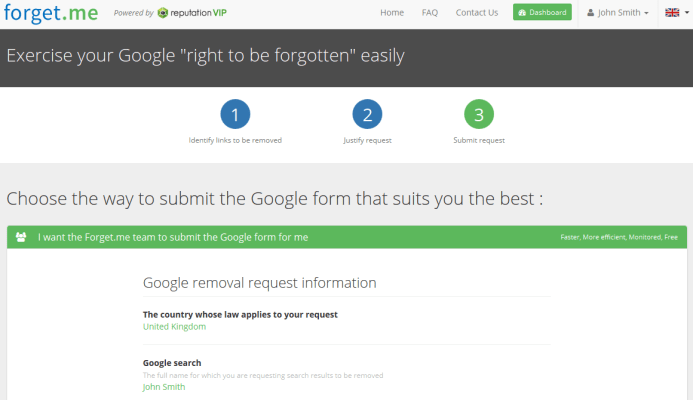One company’s regulatory pain is another company’s pleasure. Following the recent European Court Of Justice ruling in which Google must respect an individual’s “right to be forgotten” and remove “irrelevant” and “outdated” information that contravenes an EU privacy directive, a new service has launched to help users file a request with the search giant.
Despite Google in Europe offering a fairly straight-forward “right to be forgotten” online application form of its own, Forget.me promises to make the process even easier. The free (for now) service takes a user step-by-step, helping them locate the offending URLs and word their claim correctly so it has the best chance possible to stick.
From there on in, Forget.me will track your claim while it’s in Google’s pipeline of people wanting not to be found — i.e. have certain web pages, images and videos associated with a search of their name de-indexed — including alerting you when the offending URLs have been removed. Presuming, of course, Mountain View agrees with your interpretation of Eurpoean law.
But actually, the company behind Forget.me has previous form in this space. It comes from Reputation VIP, the French online reputation management startup whose main line of business is to help individuals and businesses monitor and influence their online footprint.
It’s also been a long-time advocate of the need to wrest control away from Google’s algorithm — specifically, the “right to erase our internet footprints” — so, presumably, conflict-of-interest aside, the startup must have been pleased by the European court’s decision.
Here’s an excerpt from Reputation VIP “ethics committee” blurb, which makes for interesting reading:
Should we allow algorithmic robots to rank information? They prioritise our traces on the web according to secret criteria and claim to present us with what’s popular. But what’s popular is what comes out more frequently as a function of an all too often voyeuristic attraction. We therefore enter into the arena of the spectacular.
We have to add that the order is never neutral. Items appearing on the first page of a search engine result are perceived as truth, while those on the second page are perceived as questionable or false. Symptomatically, the medium is the message…
Whichever side of the privacy versus censorship debate you side with, there’s no doubt that Google and its algorithms, steeped in secrecy as they are, hold a substantial amount of power that needs the correct checks and balances.
There are those, however, such as Wikipedia founder Jimmy Wales, who think Europe’s new “right to be forgotten”, as well-meaning as it is, does not provide the answer.
Meanwhile, as my colleague Natasha Lomas quipped, it looks like the cottage industry of ‘forget-me’ startups has begun spinning up.
